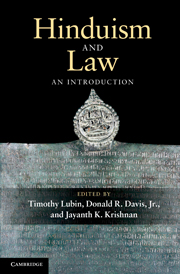Book contents
- Frontmatter
- Contents
- List of contributors
- Acknowledgements
- Chronology
- Abbreviations
- Map South Asia: political divisions c. 1860 and today
- Introduction
- Part I Hindu law
- Part II Law in ancient and medieval Hindu traditions
- Chapter 7 Hindu jurisprudence and scriptural hermeneutics
- Chapter 8 Indic conceptions of authority
- Chapter 9 Śūdradharma and legal treatments of caste
- Chapter 10 Law, literature, and the problem of politics in medieval India
- Chapter 11 Hindu law as performance
- Part III Law and modern Hinduism
- Glossary
- Bibliography
- Index
Chapter 7 - Hindu jurisprudence and scriptural hermeneutics
Published online by Cambridge University Press: 05 June 2012
- Frontmatter
- Contents
- List of contributors
- Acknowledgements
- Chronology
- Abbreviations
- Map South Asia: political divisions c. 1860 and today
- Introduction
- Part I Hindu law
- Part II Law in ancient and medieval Hindu traditions
- Chapter 7 Hindu jurisprudence and scriptural hermeneutics
- Chapter 8 Indic conceptions of authority
- Chapter 9 Śūdradharma and legal treatments of caste
- Chapter 10 Law, literature, and the problem of politics in medieval India
- Chapter 11 Hindu law as performance
- Part III Law and modern Hinduism
- Glossary
- Bibliography
- Index
Summary
In classical Hindu India the discipline of legal theory or jurisprudence (Dharmaśāstra) always bore close conceptual links with that of scriptural hermeneutics (Mīmāṃsā). Mīmāṃsā provided what came to be the dominant account of the nature and origin of legal texts and the rules they encoded, and the most widely accepted justification for their validity and trustworthiness as codes governing human conduct. The practitioners of Mīmāṃsā (or Mīmāṃsakas) became what one might call the primary ideologists of Dharmaśāstra, taking it upon themselves to construct airtight arguments for its authority, and defending it against any legal/moral textual traditions which sought to rival it (most notably Buddhism and Jainism, but not limited to these, as we shall see). Yet despite this close linkage at the level of theory, for much of their history the practitioners of Mīmāṃsā and Dharmaśāstra show some surprising divergences in their interests, preoccupations, and textual practices. There was very little professional overlap between the two fields: Up until the sixteenth century, there were only a handful of people who wrote in both areas. More notably, though, most writers on Dharmaśāstra seem to have had little or no interest in the epistemic justification of the authority of Dharmaśāstra in general, or of the specific texts they were concerned with. They seem prepared to take this authority for granted, and devote themselves instead to the specifics of interpretation: trying to determine exactly what actions the dharmaśāstras prescribe, rather than explain just why it is that we should believe them. In doing so, as we shall see, they show extensive familiarity with, and make extensive use of, hermeneutic principles developed by the Mīmāṃsakas, but they tend to avoid or downplay any potential questions about the authenticity or authority of the basic texts of Dharmaśāstra – questions which, as we shall see, were of major concern to the Mīmāṃsakas in their own discussions of Dharmaśāstra.
- Type
- Chapter
- Information
- Hinduism and LawAn Introduction, pp. 123 - 136Publisher: Cambridge University PressPrint publication year: 2010
- 4
- Cited by



